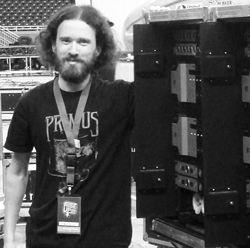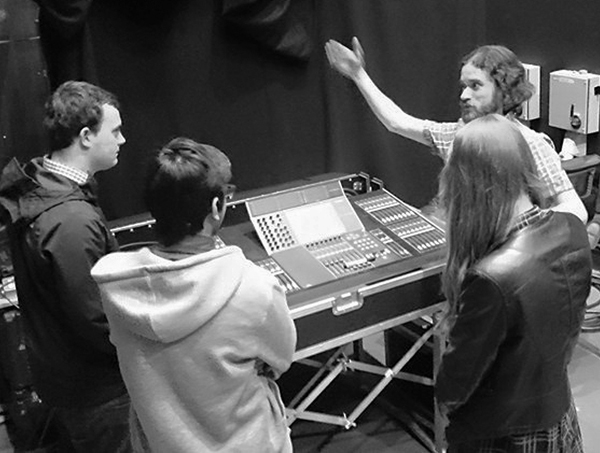
His knowledge of instruments and backline gained during the band days, however, soon led to working at gigs, where he also shadowed monitor and front of house engineers to watch them ply their trade. That first summer he got a shot at mixing monitors, and the next year he continued with monitors as well as front of house.
“I still prefer monitors,” he notes. “A few years back there was a stretch of doing mostly FOH, but with monitors you can have more than 20 different mixes. It’s more challenging, and I also enjoy working with the musicians.”
The scope expanded over the years to working every live sound role, including system tech and design, with hundreds of diverse artists, including Alice Cooper, The Allman Brothers Band, Buddy Guy, Cheap Trick, Ben Folds, Debby Boone and Dierks Bentley.
“That’s what we do at GCS,” he adds. “I’m not going out on tour for months. Every single day it’s a different band or bands at one-offs and festivals.”
A particularly memorable show came along in 2005, where he was working as the monitor system tech for a top funk/pop group. The stage was outfitted with upwards of 30 proprietary monitors that Hill spent most of his time swapping out because the band was convinced they were blown. Only one wedge actually proved defective, but he notes, “It’s a gig that stands out for getting that rush of being in the moment and making it happen.”
The relationship with GCS continues to this day, with Hill returning to Chicago following the conclusion of each academic year to work summers on the company’s busy (and growing) schedule of shows, festivals and events.
Merging Two Worlds
With the encouragement of Professor Morton, he pursued a broad range of study after being awarded his BSE degree from Miami, including a Master’s (MSc) in Acoustics and Music Technology from the University of Edinburgh followed by a PhD in Electronic Systems Engineering from the University of Essex.
During his time at the latter, Hill credits Professor Malcolm Hawksford – a highly respected and accomplished researcher and developer of analog and digital audio systems – with encouraging him to pursue adventurous ideas in research but to always focus on real world applications.
“That’s what being involved in live sound provides,” Hill explains. “The crazy ideas I dream up – even if they are indeed crazy – can be implemented in practice. So if I’m coming up with a new technique for, say, subwoofer alignment, the question becomes, ‘Is this practical? Would I be able to use this on a gig?’ If the answer is no, I do back to the drawing board and find a way to make it realistic.
“I can be engineering with GCS and an idea will pop into my head,” he continues. “I’ll be struggling with something and think, ‘It would be great if I had this,’ and the beauty is, I can go back to Derby and work on the solution, often in collaboration with Gary (Gand) and Adam Rosenthal at GCS.”
Granted not all solutions call for research, he says in noting that, in his opinion, the most indispensable tool for live audio work is the Shure SM58 microphone. (“Which, in a pinch, I’ve also used as a hammer,” he adds.)
Many of his ideas generate from discussions with undergraduates, postgraduates and colleagues, and the dialogue between he and his students, Hill maintains, is the most important part of his job as an educator.
“Students might not have been working in this field for years and aren’t dug into certain ways of thinking,” he says, “so they’ll come up with really interesting approaches to a problem.” It’s right in line with a quote from Frank Zappa that he counts as one of his favorites: “Without deviation from the norm, progress is not possible.”

